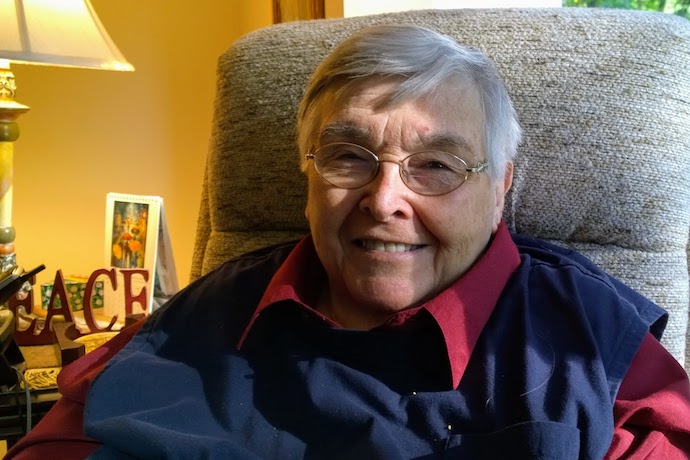How do you start at Bob Jones University and end up one of the pre-eminent transgender theologians in the U.S.?
Virginia Ramey Mollenkott’s books jolted the evangelical world and even caused Bob Jones III, then president of her alma mater, to call her “a devil” and to write in 1989, “I believe it would not be unfit to pray for her destruction….”
His prayers failed. She lived a long and healthy life, born in 1932 and dying peacefully on September 25 at her home in Pompton Plains, New Jersey.
Today her 2001 book Omnigender: a Trans-Religious Approach (Pilgrim, 2001) continues to give hope to transsexual and transgender Christians such as Sister Paula Nielsen and David Weekley, the first openly transgender clergy serving the United Methodist Church.
“S/he opened so many doors for so many people,” said Chris Paige, founder of Transfaith, in a Facebook post. “Virginia’s life started with great pain but s/he fought her way to joy. I am grateful that I got to be a part of her work and that s/he got to be a part of mine.”
Omnigender explores the sexual continuum, gender fluidity, the suffering of intersexual persons, and transgender identity in society and in Scripture. In it she acknowledges her own identity as a masculine woman, transgender but not transsexual.
Mollenkott’s pioneering work in feminist biblical analysis, feminist theology, and LGBTQ theologies made her a sought-after speaker at churches, conferences, universities and seminaries. She authored or co-authored 13 books and hundreds of articles and book reviews.
“Virginia Mollenkott was a courageous and generous soul,” said Pamela R. Lightsey, associate dean and professor at Boston University School of Theology. “Another fighter for justice has joined the ancestors. Amen.”
Is the Homosexual My Neighbor? Another Christian View (HarperCollins, 1978, rev. 1994) was co-authored with Letha Dawson Scanzoni. Appearing just seven years after the National Organization for women debated and passed a resolution to recognize lesbian rights as “a legitimate concern of feminism,” this book met widespread opposition among evangelicals.
“We’ll never know the number of LGBTQ Christian lives saved by this groundbreaking book,” comments Christian Feminism Today on its website.
An earlier book, Women, Men, and the Bible, attracted widespread attention in 1977, giving hope to women raised in conservative denominations that required women’s submission to men.
Mollenkott spoke at two of the first conferences of evangelical feminists: one in 1973 at Baptist Theological Seminary in Denver and another in 1975 to the newly founded Evangelical Women’s Caucus in Washington, D.C. Over the next forty years she gave plenary speeches at almost every biennial conference of EWC, now known as EEWC-Christian Feminism Today.
Using inclusive language to refer to the Eternal One was important to her. She wrote The Divine Feminine: The Biblical Imagery of God as Female (Crossroad, 1993), which influenced many and caused her to be chosen as a stylistic consultant for the New International Version of the Bible. She also served on the committee preparing An Inclusive Language Lectionary (National Council of Churches, 1983-85).
“She worked to make the language of Christianity more inclusive, the spirituality more palatable, and the whole enterprise more welcoming,” said Mary E. Hunt, co-founder of WATER, the Women’s Alliance for Theology, Ethics, and Ritual in Silver Spring, Maryland.
Born on January 28, 1932, in Philadelphia, Virginia Ramey was raised in a Plymouth Brethren congregation and sent to a private, conservative Christian high school in Florida. After graduating from Bob Jones University in 1953, she taught there and married Frederick Mollenkott in 1954. They had a son, Paul, in 1958.
Returning to Philadelphia, she earned an M.A. at Temple University in 1955 and a doctorate in English literature at New York University in 1964, specializing in the study of John Milton. In 1973 she left her marriage and fully accepted herself as a person attracted to women.
From 1967 to 1997, Mollenkott taught at William Paterson University in New Jersey, retiring as Professor of English Emeritus.
In 2018, Mollenkott was predeceased by her long-term domestic partner Judith Suzanne Tilton, whom she married in 2013 after the Supreme Court legalized same-sex marriage. She is survived by her son Paul Mollenkott, his wife Barbara, and granddaughters Miranda, Serena, and Corinne.
Clues to her remarkable journey from fundamentalism to feminism and LGBTQ leadership can be found on her website and in the six-part oral history at LGBTQ Religious Archives Network.


